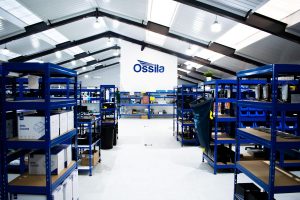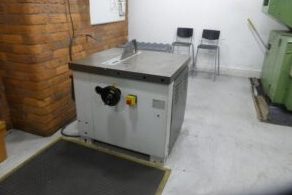Pyronix looks ahead to secure future

SECURITY equipment manufacturer Pyronix’s investment in research and development is helping it reach sales of £20m.
The firm, which is a world leader in the manufacture of security equipment including control panels, detectors and external sounds, has grown 15% every year since 2010 and is now on course to reach £20m of annual sales by the end of 2014, 40% of which is in international markets.
As a result of this growth, the Rotherham-based company has added eight new people to its 140 workforce in the last 12 months.
Colin Beresford, group commercial director, said: “We invest significantly in R&D and in continually bringing new products to market.
“Our most recent success has been led by the development and launch of the double award winning Enforcer, an innovative two-way wireless security system. This has surpassed even our most optimistic projections and is selling into many countries across the world.”
Pyronix said it invests over £1m every year on R&D.
Pyronix has managed its growth by expanding production back in Yorkshire and, currently, about 60% of manufacturing takes place here in the region.
“We know we can keep better control over our intellectual property and reduce stock levels if our supply chain is more local and this is a philosophy we are following,” Beresford added.
“We’ll never be able to make all our products in Yorkshire, as some are ideally suited to China, but the intention is to continue to expand local production.”
Pyronix was one of the companies questioned in the latest Manufacturing Advisory Service’s (MAS) Barometer and reflects the positivity currently being felt across Yorkshire and Humber.
The Barometer found that improving delivery performance is the main driver for small to medium sized manufacturers in Yorkshire and Humber looking to bring production back to the UK.
One in five respondents stated that concerns over lead times and reliability were the principal reasons for re-shoring, followed by reducing costs (17%) and improving quality (16%).
However, the cost of domestic labour continues to remain the biggest barrier for producing within the UK according to manufacturing SMEs, with well over one in ten also concerned about the availability of the right skills.
David Caddle, area director for MAS, said: “There is certainly a growing desire from our companies to bring production home, with 21% of firms surveyed either actively planning or considering re-shoring, compared to just 3% that have offshored in the last year.
“This marks a major change in approach from five years ago when the Far East and Eastern Europe seemed to be the destination of choice.
“Buyers have realised that there is more to the ‘landing’ price than meets the eye, with delays in logistics and issues around quality adding a whole layer of hidden costs.
“At MAS, we have experts in place who will work with companies to review the viability of re-shoring through cost/benefit analysis, not to mention supporting them in taking full advantage of new opportunities driven by UK manufacturing’s growing popularity.”
The Barometer, which featured the views of more than 60 manufacturing SMEs from across Yorkshire and the Humber, reinforced the recent feel good factor, with nearly two thirds (65%) reporting enjoying an increase in sales over the last six months – a 3% rise on the previous quarter.
Encouragingly 78% of firms are expecting to grow between now and April 2014, whilst 97% are planning to take on new staff or keep the size of their workforce the same.
There also appears to be a pattern of steady growth in companies embracing new technologies (43%) and investing in machinery and premises (52%). The latter represents a 13% increase from the same period last year.
Caddle added: “The recent Foresight Report detailed the need for industry to move to more advanced, higher value manufacturing and this is being reflected in the Barometer.
“We have seen a two-year high in the number of firms investing in new technologies and this tells us that manufacturers are not only optimistic about the next six months, but also have one eye on the longer-term picture.”
The publication of the latest MAS Barometer marks the start of the first ever Manufacturing Matters week, which is looking to showcase England’s manufacturing SMEs – a sector that currently accounts for more than 110,000 businesses and 1.1m jobs.
In addition to this report, there will be over 50 events held across the country with a specialist focus on access to finance, innovation, international trade and offshore wind.

 Chairman and chief executive of Pyronix, Julie Kenny, was awarded the 2013 Business Woman of the Year accolade last month.
Chairman and chief executive of Pyronix, Julie Kenny, was awarded the 2013 Business Woman of the Year accolade last month.






